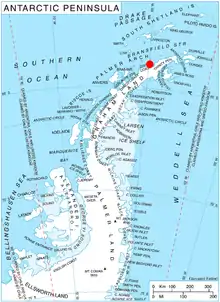Charcot Bay
Charcot Bay is a bay about 10 nautical miles (20 km) wide between Cape Kater and Cape Kjellman along the Davis Coast of Graham Land. It was discovered by the Swedish Antarctic Expedition, 1901–04, under Otto Nordenskiöld. He named it for Dr. Jean-Baptiste Charcot, a noted Arctic explorer.

Geographical features
Like the bay itself, many of its coastal features were discovered by the Swedish Antarctic Expedition under Nordenskiöld. Unless otherwise noted, the following features were charted and named by the SAE.[1] Places named for Bulgarian localities and people were mapped by a German-British survey in 1996.[2][3]
Whittle Peninsula
To the west, Charcot Bay is defined by Whittle Peninsula, a 5 nautical mile- (9 km) long peninsula which terminates in Tarakchiev Point to the west, Cape Kater to the northwest and Radibosh Point to the north.[2][4][5] The peninsula was surveyed by SAE in 1902, and named in 1977 by the United Kingdom Antarctic Place-Names Committee (UK-APC), who named it after Royal Air Force officer Frank Whittle.[6]
Whittle Peninsula's westernmost point is Tarakchiev Point, named for Bulgarian pioneer of aviation Prodan Tarakchiev.[4] Cape Kater, fringed by rocks, was first sketched by a British expedition of 1828–1831, under Henry Foster. He named it for Henry Kater, one of the planners of his expedition. When the area was more thoroughly mapped by SAE, they named it Cape Gunnar; the official name retains the earlier naming.[5] About 1 nmi (2 km) northwest is a small cluster of rocks called the Kater Rocks.[1] On the peninsula's north side is Radibosh Point, named in June 2010 for the settlement of Radibosh in western Bulgaria.[2]
East along the coast
The retreat of Andrew Glacier in the second half of 20th century revealed some features on the shore in the glacier's wake. Named Ognen Cove, for the settlement of Ognen in Southeastern Bulgaria, it stretches 2.8 km wide and 1.55 km deep.[7] On its east side, it is bordered by Nikyup Point, named after the settlement of Nikyup in northern Bulgaria.[8]
Almond Point is a rocky point between Whitecloud Glacier and McNeile Glacier at the head of Charcot Bay. It was charted in 1948 by the Falkland Islands Dependencies Survey (FIDS) and named for its distinctive shape.[9] Lindblad Cove is 5 km wide, between Almond and Auster Point. It was named in 1995 by the Advisory Committee on Antarctic Names in 1995 in commemoration of Lars-Eric Lindblad, a conservationist and pioneer in Antarctic tourism.[10]
Auster Point is a headland midway along the east shore of Charcot Bay. It was named by UK-APC after the Auster aircraft used by British expeditions in this area.[11] North of this point is Slomer Cove, which indents the coast to 5.9 km deep and whose mouth runs 11.2 km wide between Auster and Cape Kjellman. The cove is named after the settlement of Slomer in northern Bulgaria.[3]
Nomenclature
Like the bay itself, many of its coastal features were discovered by the Swedish Antarctic Expedition under Nordenskiöld. Unless otherwise noted, the following features were charted and named by the SAE.
References
- "Kater Rocks". Geographic Names Information System. United States Geological Survey, United States Department of the Interior. Retrieved 2013-04-14.
- "Radibosh Point". Composite Gazetteer of Antarctica. Scientific Committee on Antarctic Research.
- "Slomer Cove". Composite Gazetteer of Antarctica. Scientific Committee on Antarctic Research.
- "Tarakchiev Point". Composite Gazetteer of Antarctica. Scientific Committee on Antarctic Research.
- "Cape Kater". Geographic Names Information System. United States Geological Survey, United States Department of the Interior. Retrieved 2013-04-14.
- "Whittle Peninsula". Geographic Names Information System. United States Geological Survey, United States Department of the Interior.
- "Ognen Cove". Composite Gazetteer of Antarctica. Scientific Committee on Antarctic Research.
- "Nikyup Point". Composite Gazetteer of Antarctica. Scientific Committee on Antarctic Research.
- "Almond Point". Geographic Names Information System. United States Geological Survey, United States Department of the Interior.
- "Lindblad Cove". Geographic Names Information System. United States Geological Survey, United States Department of the Interior. Retrieved 2013-06-17.
- "Auster Point". Geographic Names Information System. United States Geological Survey, United States Department of the Interior.
![]() This article incorporates public domain material from "Charcot Bay". Geographic Names Information System. United States Geological Survey.
63°48′S 59°35′W
This article incorporates public domain material from "Charcot Bay". Geographic Names Information System. United States Geological Survey.
63°48′S 59°35′W